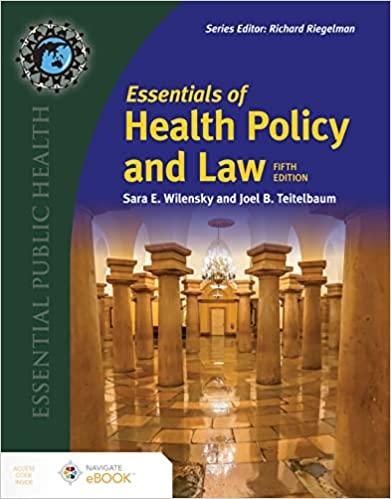Question
Recently, the Supreme Court's decision in the Dobb v. Mississippi case was leaked. Although the Supreme Court has not announced their final decision, thedraft opinionindicates
Recently, the Supreme Court's decision in the Dobb v. Mississippi case was leaked. Although the Supreme Court has not announced their final decision, thedraft opinionindicates that SCOTUS may effectively overturnRoe v. Wade, which establishes a woman's constitutional right to an abortion before the fetus is viable, as well asPlanned Parenthood v. Casey.
In addition to the impact on reproductive health rights, is the broader issue of the right to privacy itself. Many commentators and scholars have raised the alarm regarding the potential impact of the end of Roe on other rights such as same-sex and interracial marriage, contraception, medical treatment, and bodily integrity. The Roe precedent could also implicate data privacy in two ways. First, it could potentially undo the privacy standard on which our understanding of digital privacy rights are built. Second, the elimination of Roe could open the door to increased digital surveillance by states seeking to enforce laws that criminalize abortion by using search histories, text messages, location data, social media activity, purchasing records, and use of reproductive health apps as evidence in legal cases against people seeking abortions. For example, in states that make it a crime to help a person seeking an abortion such asTexasandOklahoma, data from women's period-tracking or pregnancy apps could be subpoenaed as evidence against the person who assisted them. Hypothetically, a woman who started her period, stopped her period, and then started her period again within a short amount of time, could become evidence of that woman's criminality or that of her physician. Information regarding abortion inducing medications purchased legally online would be traceable to a person living in a state with an anti-abortion law. It is already commonplace for law enforcement and prosecutors to subpoena tech companies to provide user data or purchase it from data brokers in connection with the prosecution of other crimes.
In the absence of federal digital privacy law, most states have enacted their own laws regulating digital privacy. Similarly, assuming Roe is overturned, and in the absence of afederal law codifying the right to abortion, some states have trigger laws in place or plan to enact anti or restrictive abortion laws. In both cases, the lack of federal legislation will likely result in a confusing patchwork of laws.
Please address the following questions with respect to digital privacy.
(1) What should be the role of digital service providers in facilitating access to health and other information?
(2) What are some ways people can protect their digital privacy post Roe?
Helpful articles
Article: How Digital Abortion Footprint Could Lead to Criminal Charges and What Congress Can Do About It?
Article: What Roe v. Wade Means for Internet Privacy
Video:https://abcnews.go.com/US/video/privacy-advocates-raise-concerns-phone-data-roe-wade-84592059
Podcast: Dangers of Data in a Post Roe World
Step by Step Solution
There are 3 Steps involved in it
Step: 1

Get Instant Access to Expert-Tailored Solutions
See step-by-step solutions with expert insights and AI powered tools for academic success
Step: 2

Step: 3

Ace Your Homework with AI
Get the answers you need in no time with our AI-driven, step-by-step assistance
Get Started


